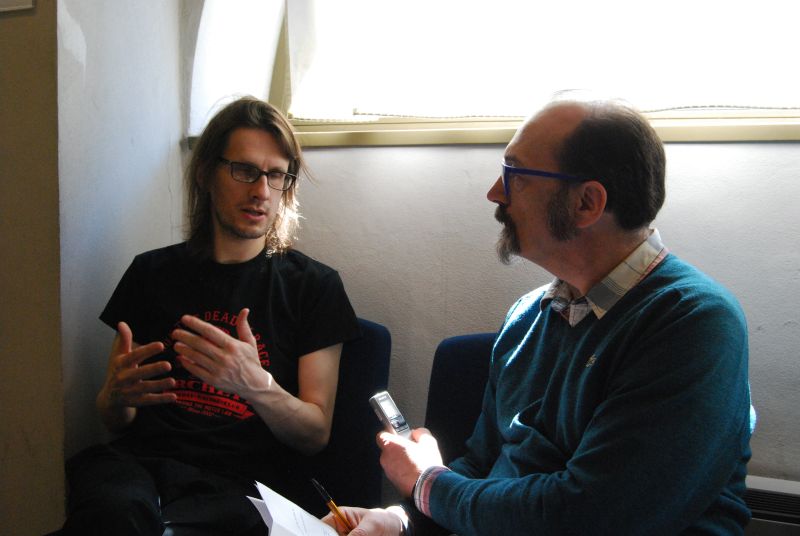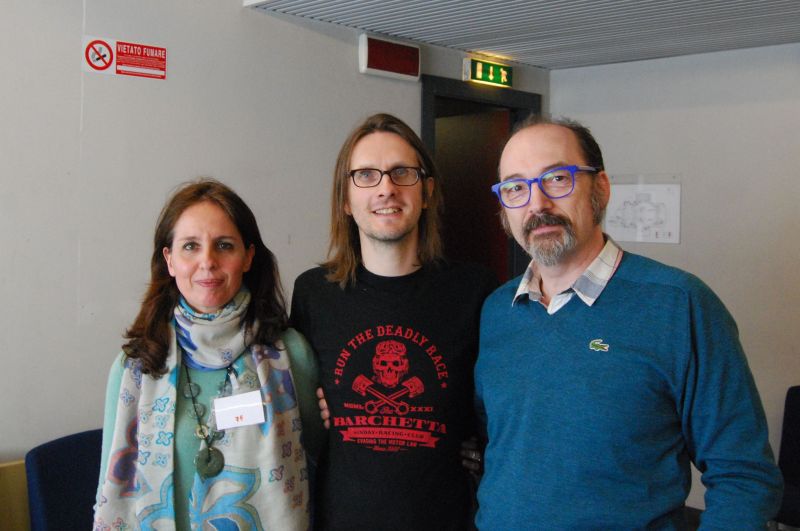
| INTERVIEW WITH
STEVEN WILSON 03/30/2015 (italian
version) by Giancarlo Bolther and Laura Medei |
GB. Hi Steven. This is our second interview, we first met in Milan two years ago, just before the beginning of The Raven Tour. SW. Yeah, I remember your face. GB. Really? Nice! Let's start talking about your new album, Hand. Cannot. Erase. Could you tell us a little bit about the making of it? How did you get your inspiration? SW. Yes... The inspiration came from a true story I’ve heard and a documentary film that was made about that story. The story was about a young woman, called Joyce Carol Vincent, who was found dead in her flat in London about ten years ago and her body had been undiscovered for more than two years, which was an extraordinary shocking thing to hear. I remember hearing the story in the news, but I didn’t think too much about it because I assumed, like a lot of people I think would have assumed, she must have been a little lonely old lady. It was only when I saw the documentary, it came out about three years ago, that I discovered the circumstance was different: she was very young, or relatively young, in her late thirties, an attractive, popular young woman. So the story became even more shocking, and became for me a story about life in the modern world, life living in a big city in the twenty first century and how easy is to disappear from view, particularly if you deliberately isolate yourself. You do largely become invisible if you live in a large city. So her story became symbolic for me, of that very modern twenty first century phenomenon. GB. Your previous two albums, Grace For Drowning and The Raven That Refused To Sing, have been considered masterpieces and crowned as “best album of the year”. It should not be easy to get back at work trying to create new stuff after such a success. Haven’t you ever been afraid of repeating yourself? SW. Oh, I’m very afraid of that. I think that in some way my biggest fear is that anytime I come to create something new I will discover there is nothing left to say. But I think that is the fear of almost every creative person, whether you’re a writer, whether you’re a film maker, a musician. Everyone has this fear of... well, the fear of the blank page, you know. Staring at a blank page and... How am I going to fill it? How am I going to fill it with something that is different from all the other stuff I’ve already done? Because I think one thing I really find problematic is the idea of repeating oneself, and it would be very easy for me to just do the same thing again. But when I was inspired to be a musician, when I was a teenager, the kind of artist I’ve really loved and really admired, not just musicians but film makers or other artists, were the ones that always reinvented themselves, with doing something different. Sometimes they did risk their popularity, because they felt that would be more important for them to feel like they were evolving. So people like Frank Zappa, like Stanley Kubrik, the film maker, David Bowie... These artists can constantly reinvent themselves and I definitely felt that the pressure this time was not trying better but instead doing something different. |
 |
GB. Many times you’ve been asked whether you would come back playing with Porcupine Tree again or not. If I were in your shoes, doing what you’ve been doing till now, I’d feel annoyed hearing that. What about you? SW. If you have a career like I have now, part of what’s beautiful in that, in a way, is that there are people that will always love what you’ve done in the past. That’s a good thing, you know, it’s a lovely thing. Where it becomes... you’ve used the world annoying, well, where it becomes slightly irritating is people expects you to stand still and that comes back to your previous question. It’s important for me to feel like I’m evolving, progressing. There are some fans that actually would prefer me to make the same record over and over again, that’s to say more of the same, more of the same, more of the same. That to me is like creative death. So, the way I look at this... Well, this records exist, they’re in the past, I’m happy you love them, keep loving them, keep enjoying them, meanwhile I need something different. It’s flattering people love these records, but at the same time they have to accept, they have to understand that life goes on. I mean I do not believe, I’m not religious, I don’t believe there is anything out this life, I think this is it, this is the opportunity we have. We’ve got seventy or eighty or ninety years, whatever we’ve got, to do as much as we possibly can with our lives. GB. You know that goes the same for ones who believe. Christians believe in life after death, but this life on earth is the only opportunity they have to do the best they can. SW. It’s true, I suppose. But I think the point I’m making is there are some people that think it’s ok to be in some form of stasis, even unhappiness, you know there are many people who justify the unhappy situation with the idea of there’ll be something better waiting for them. I don’t believe that. So for me it’s all about I have to find a way to make myself happy and fulfilled and to fill my life with happiness and fulfilment as much as I can. GB. Isolation is a recurring theme in most of contemporary music, in yours as well. Tens of albums speak of isolation. Just to name a few, Quadrophenia by the Who, The Wall by Pink Floyd, may be Ok Computer by Radiohead, or Kid A. In your opinion is there a connection between art and isolation? Could an artist feel isolated because of his own art? SW. I think that’s something about being a musician that makes you even more aware of this. Because... listen, I meet many people, I mean my fans, I meet many people from many different countries, and I get to talk about this thing very often, and to express it through my work. And I think a musician is also in a fairly unique position: you have certain times in your life when you are completely isolated, when you’re writing at home. And then you have certain times in your life where you’re playing to thousand people every night, and you see many different cities, many different countries, so you get to see both sides. I get people discussing my music and they would have different perspectives on the lyrics. And there is something about living on the road, living into hotels, living into busses, these things make you aware about the loneliness, sometimes, even in thousands of people. Someone would say the loneliest place to be is standing up on a stage in front of thousand people, and I understand that. We’re also living in a time where technology is changing the world in such a phenomenal rate. You have mentioned OK Computer, well, that’s an appropriate example, but it’s eighteen years old now and it talks about the modern world at that time, that would be completely different from the world we living now, completely different. There were hints of self-phones, of the internet, ok, they were just about on the horizon, but now they completely dominate our every waking moment. The internet, mobile phones... So I think there’s always a different way to approach same subjects. |
 |
GB. Does the name of the album mean anything particular? It looks a bit mysterious! Those three dots... SW. It does have a meaning to me, but I don’t want to explain what the meaning is. Because for the reason you do not mention, it has a kind of mystery too. I’m a great believer that one of the special things about pop music or rock music is the magic, the mystery. You don’t get everything explained to you. There’s something I find exciting about music: people often come to me with interpretations of my songs that are completely different to the ones I’ve intended, but of course no less valid, it’s just interesting. Well I could easily have called this album “The loneliness of living in a city”, ‘cause it’s about that, but it’s about lots of other things too, so I like the idea of picking a title which could suggest a mystery too and which expect to the listener to interpret themselves. GB. Someone wrote somewhere you’re a “Rock Renaissance man”, a label of a certain importance, don’t you think? How do you feel about that? SW. I could say I’m doing something very old-fashioned, although I’m not constantly doing that. I’m kinda working on something which is actually in the way the world has moved on from, because rock music is no longer the force that it was. In the Sixties, Seventies, Eighties, even in early Nineties, grunge rock was very mainstream, but that was pretty much the last time. Since then rock music has become a kind of underground niche, like jazz. Well, I think rock is going the same way. Listen, I still love it, I still think it’s magical, I still think there are people out there that want intelligent album orientated rock music. I’m quite disappointed by most contemporary rock music I hear. So I like to keep on providing some alternative to them. GB. The choral parts in the album are touching, really beautiful. They bring back to Crosby Still Nash & Young, or Gentle Giant. Do you remember when and how you first get interested with choirs? SW. Yes, with Brian Wilson. I love Crosby Still Nash & Young but I remember discovering Brian Wilson and the Beach Boys, and hearing at Pet Sounds, Smiley Smile, 20/20, Friends, Surf’s Up I’ve just been spellbound by the vocal arrangement and I’ve started to experiment with that about in the mid or late Nineties. One thing is relevant: I was never that confident with my voice. Well, I’ve an ok voice but not the strongest voice, so one of the ways I’ve found to make it feel stronger was to start working with multitracking, harmonizing and layering my voice. And I did that by listening to things like Brian Wilson, Beach Boys, Todd Rundgren, Crosby Still Nash & Young, those kinds of artists. |
 |
GB. You’ve remixed some of the best rock albums of last four decades. The list of titles is impressive and the work you’re doing is very much appreciated. How does it go? Do the groups themselves ask you to do that or is you to choice an album and ask the group? SW. Oh... It’s never me. What to say... Listen, that’s what happens usually. That is the way it happens. The record companies come to me with their catalogue, Universal or Sony or Warner or EMI Records, whatever they are, sometimes it’s the artist. Usually they would come to me and they would say: “What are you interested in working on?” Like for example last year Universal came to me and said: “Would you like to do something for us? What you interested in doing?”. And I’ve looked to their catalogue and I’ve said “I’d like to do Tears For Fears’ “Songs From A Big Chair”, I’d like to do that this, I’d like to do that”. I’m in a fortunate position now, where I’ve got a good reputation and so these companies come to me. Sometimes artists approach me, or record company approach me, like EMI approached me few years ago, must have been in 2011. I think it was about doing the 40° Anniversary version of Aqualung by Jethro Tull. Well... Yes... It’s usually somebody... Mhm... It’s complicated. GB. If I’m right, you’re a collector of obscure albums from the Seventies, so to say... Still Life, Human Beast, very dark prog bands. Aren’t you? SW. Really... no. I’ve never heard of that... Where did you? GB. I’ve seen something in Insurgentes dvd... It shows you going to a record shop looking for that kind of albums. SW. I think what you might have... Ok, yes, there’s a scene in Insurgentes with my friend Michael from Opeth, and he does, and he looks in his... well, it looks like a record store but it’s actually his record collection, yes, I was pulling out records... To be honest, I don’t know lot about those records. He loves those records. I do collect records, collect vinyls, cds, but they cross all genres, all genres, I like everything from rock to electronic music, to obscure jazz records, to Japanese noise music, to pop to...Well, I am not that obsessed. GB. A friend of mine was in London some nights ago, at The Troxy. He said that at the end of the show David Gilmour and Bono Vox were standing with all the audience to applaud you. How does it was for you? Is that anything you could have expected when you were at the beginning of your career? SW. This is one of the nicest things of my career, I have respect not from the other bands of my generation, but from some of the artists whose music I was originally inspired, and that’s amazing. It’s started five or six years ago with Robert Fripp and King Crimson. I feel very fortunate now to be meeting and working with a lot of musicians who made me want to be a musician in the first plans... Really, that’s amazing, yes, incredible. |
 |
GB. What’s your relation with KeyScope? Do you own it? Which kind of cooperation is yours with that label? SW. No, I do not own it. I’ve just recommended a couple of bands, I’ve recommended the Pineapple Thief few years ago, but they have some bands I really don’t like. Anyway they’re doing something very important, I think they’ve created a really good identity for that label. I cannot like all the bands of that label but I do certainly like lot of them. GB. One more question about the album. It looks like it has been written from a female perspective... SW. Yes, it was. GB. It’s unusual. I mean... it must not have been easy for you to do so, I suppose. Which kind of mental work had you to do? SW. Well, I do like challenge, and one of the biggest challenges this time was writing through this female character. I don’t know how successful I was, but... you know, I was showing it to various friends, women friends, and also I think that even though you’re writing thorough a female perspective there is a lot of shared human experience. A lot of the things in the record are from my life, childhood memories, they are very specifically autobiographical, but I think they fill like they could be relevant to any teenage boy, teenage girl, child. It can work both for women and men. This idea of isolation, of loneliness, confusion in the technological age, the internet and how it can affects our life, nostalgia of the childhood, regret... All of these things I think are kind universal, anyway. So whether female or male it’s not so relevant. I think probably the difference is the perception women and men have of different things, that’s quite different. I don’t know how successful I was about that but women seem to be responding very well to the record! GB. Here we are, the last question: would you please tell us what is in your plans once completed the tour? A new album? A vacation? SW. I’m not sure! The tour that we’re doing right now is going to last until probably January, February, March next year. So this is just the beginning of probably one year of touring, and that’s good because there’s a lot of interest now, a lot more interest, which is fantastic, but it means the tour gets longer and longer and longer and longer... Middle Est, India, Australia, Japan, we’ll go to America, which is great, but it does mean that for the next year I’ll have no opportunity really to do anything. So... I’m not sure of what I’ll do next. Something I hope would come along. GB. Thank you very much, Steven! SW. Thank you too, enjoy the show tonight! Other interviews: 2013 Reviews (only in italian): Insurgentes (dvd); Grace For Drowning; The Raven That Refused to Sing; Hand Cannot Erase; 4 1/2; To the Bone; The Future Bites; The Harmony Codex Web Site Related Artists: Porcupine Tree; No-Man; Blackfield |